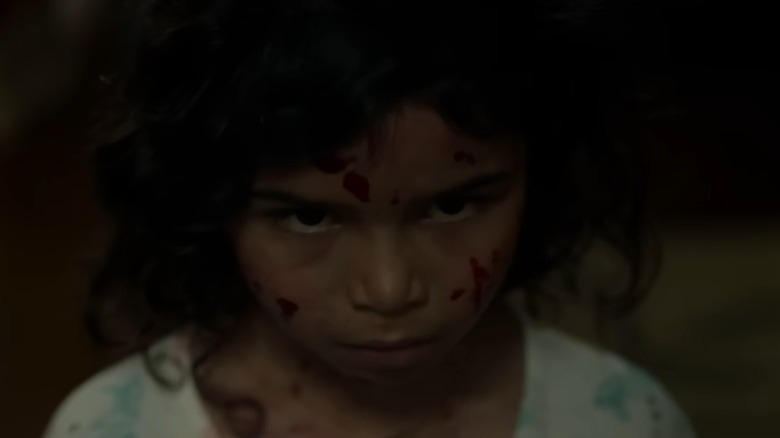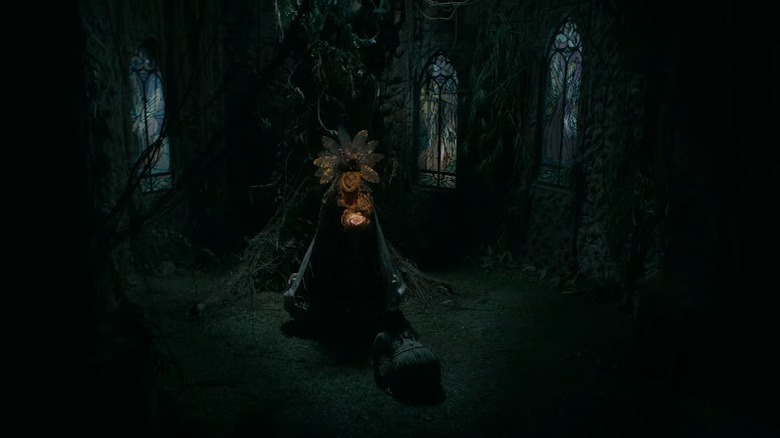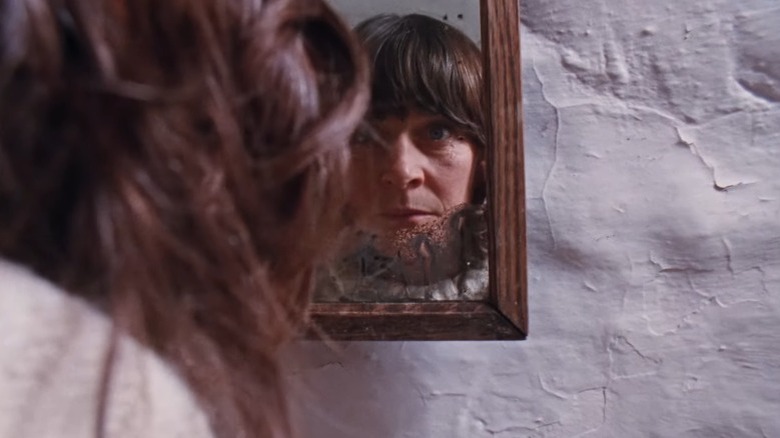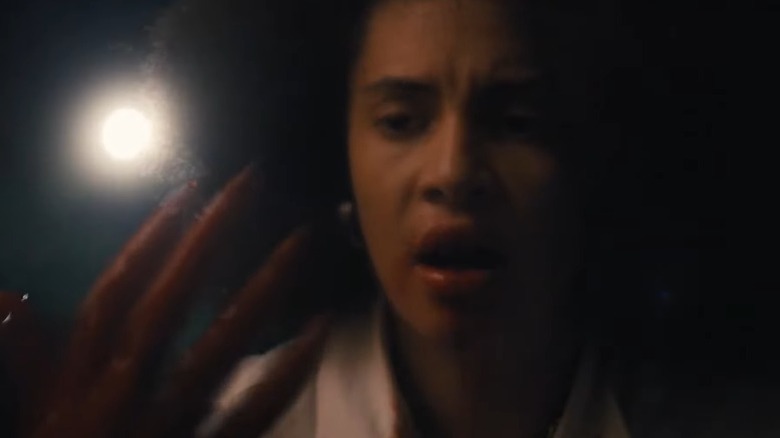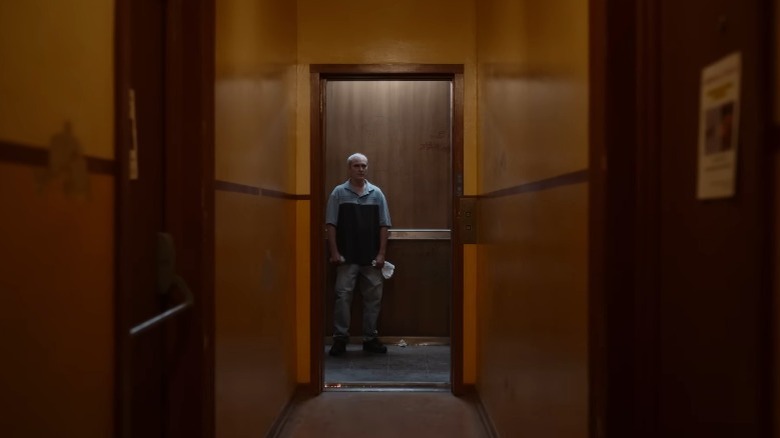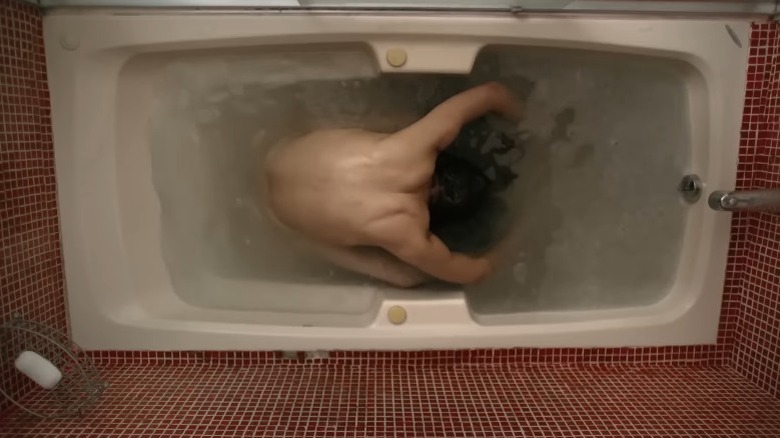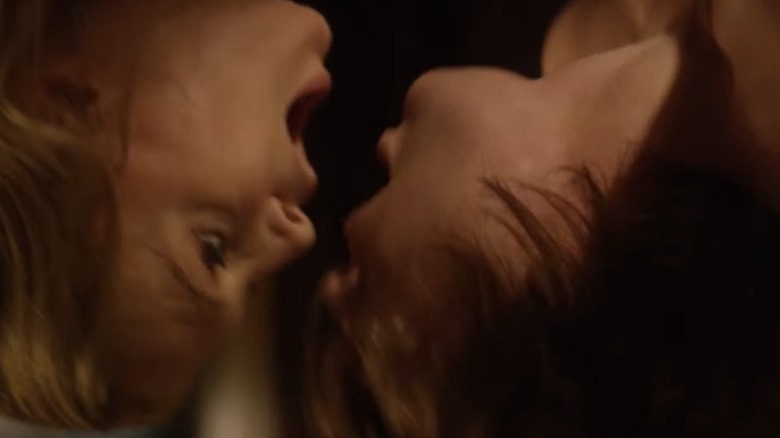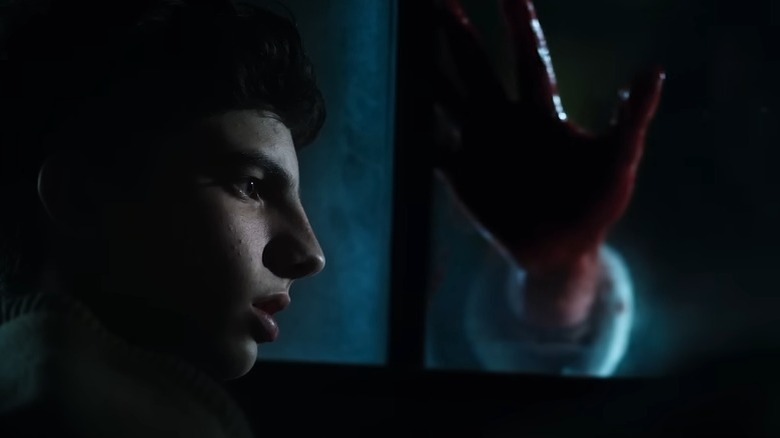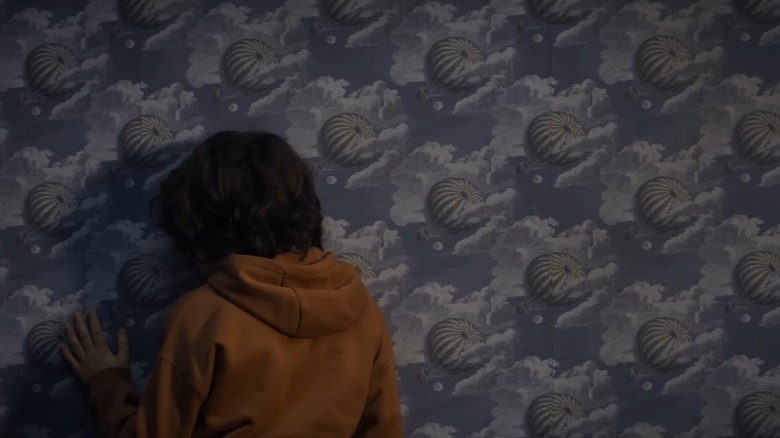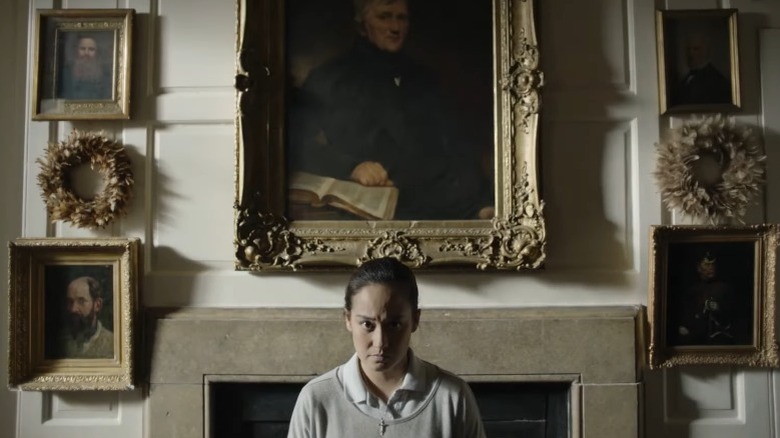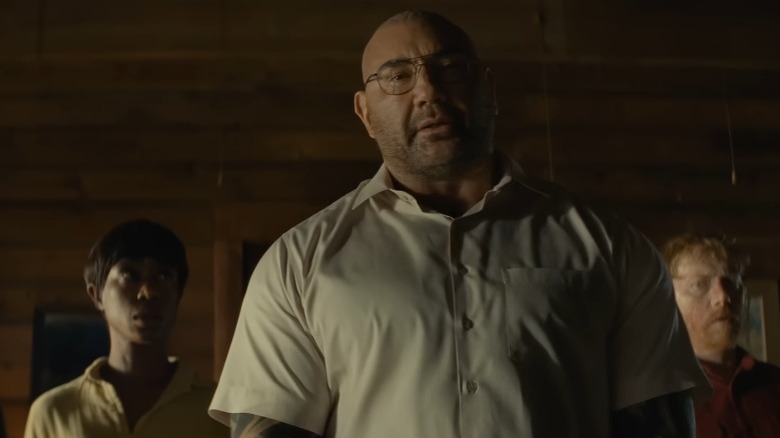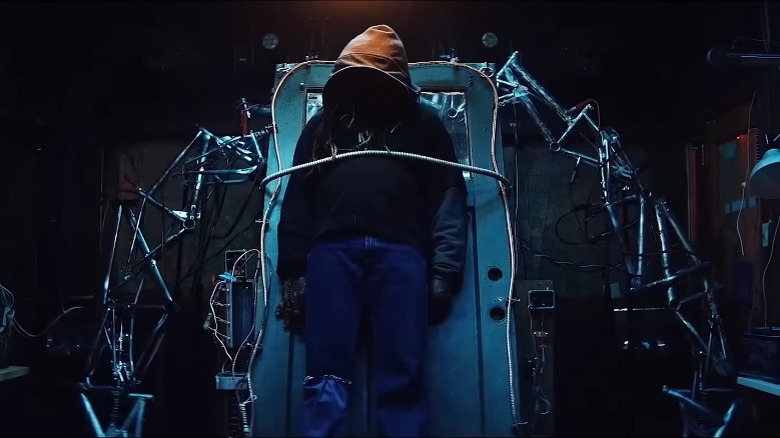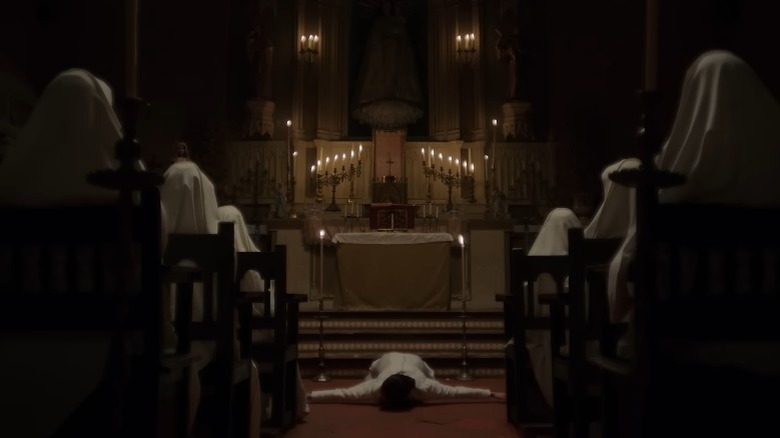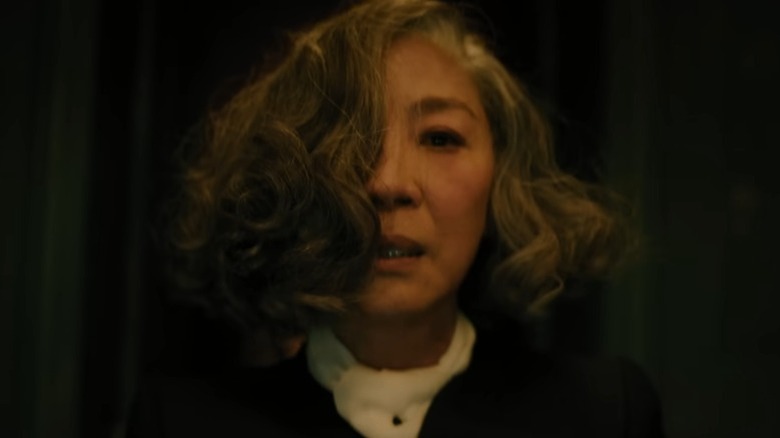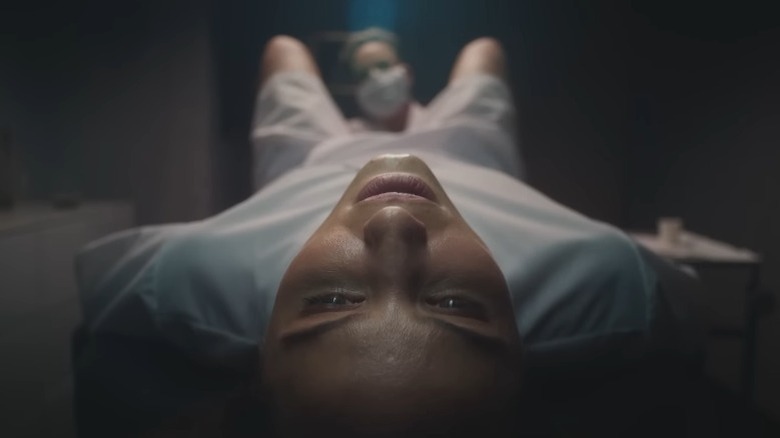The Most Underrated Horror Movies Of 2023
Great horror never gets old. The genre was as alive as ever in 2023, with the year's buzziest titles ranging from the large-scale devastation of "Godzilla Minus One" (yeah, sci-fi monsters bring horror too!) to the gnarly indie frisson of "Talk to Me," from the franchise-galvanizing prowess of "Evil Dead Rise" to the surprising earnestness of "Saw X" (and the whatever-the-heck-that-was of "Infinity Pool"). However, many of the year's best horror offerings did not achieve the levels of buzz generated by the aforementioned flicks.
This list compiles 15 exercises in fear and dread from 2023 which were grossly underrated, in that they received mixed or poor responses from critics and/or audiences. We've honed in on the ones that failed to garner the amount of attention or acclaim that their efforts deserved. Some have a lot in common with each other, and some are wildly different, but all of them are worth watching if you're a horror enthusiast.
Birth/Rebirth
For decades, the spirit of indie horror has thrived on the energy and creativity of first-time filmmakers, and that was certainly true of "Birth/Rebirth" in 2023. The first feature from director Laura Moss, this revisionist, female-centric take on the "Frankenstein" mythos approaches themes of motherhood, pregnancy, and human life's biological quandaries from a fresh, disturbing perspective.
The film stars theater and indie film luminary Marin Ireland as Dr. Rose Casper, an antisocial morgue technician who harbors a deep obsession with the concept of reanimation and often conducts experiments in her own body to further her understanding of the limits between life and death. One day, Rose crosses paths with Celie Morales (Judy Reyes), a nurse in her hospital's maternity ward, when Celie's five-year-old daughter Lila (A. J. Lister) dies suddenly and is left for Rose to autopsy.
Thanks to the knowledge she's accumulated, Rose is able to bring Lila back to life, but in order for her ultimate experiment to remain successful, she and Celie must band together to keep watch on Lila and steal life-sustaining biological material from the hospital's maternity ward. Shot through with queasy coldness and surprising realism, the film raises engrossing ethical and philosophical questions while remaining a compulsively watchable trek into the dark side of the human soul.
In My Mother's Skin
Films that turn to historical trauma and wartime atrocities as a source of dread have long been a staple of the horror genre. What makes "In My Mother's Skin" an especially interesting entry into the cinematic pantheon of historical horror is the way it melds that subgenre with folk horror, to say nothing of the light it shines on a specific ramification of World War II that often gets overlooked in the West: The Japanese occupation of the Philippines.
Directed by Kenneth Dagatan, this Philippines-Singapore-Taiwan co-production takes place in the final days of the occupation, in the secluded mansion where 14-year-old Tala (Felicity Kyle Napuli) lives with her wealthy family, as Japanese soldiers escalate the violence and repression in a desperate last-ditch bid for control. Left to care for her sick mother (Beauty Gonzalez) in the absence of her father, who has fled to seek American aid, Tala turns to a seemingly friendly forest fairy (Jasmine Curtis-Smith) for help — unaware that the fairy is a duplicitous flesh-eater with monstrous intentions. Moody, singular, and spectacularly spooky, this is a film that vibrates with the primal terror of a folktale whispered late at night.
Enys Men
Speaking of folk horror, another highlight of the 2023 indie horror landscape was Mark Jenkin's "Enys Men." One of the great things about horror as a genre is that it has the freedom to be deeply affective — i.e., driven more by the emotional impression it wants to cause on the viewer than by any predetermined storytelling rules — while still retaining a certain universal appeal. Like any number of horror classics throughout film history, "Enys Men" eventually abandons linear narrative altogether in favor of full-blown surrealism — but the ensuing hallucinatory effect only makes it all the scarier.
The sliver of a plot from which the film starts is this: An unnamed woman (Mary Woodvine) is working as a wildlife volunteer at an uninhabited island off the coast of Cornwall, documenting the development of lichen on a rare flower species. As her lonely routine wears on, both we and the woman begin to witness strange phenomena on the island, ranging from seeming ghosts to seeming hallucinations to seeming encounters with past and future selves. Very little is explained or contextualized, but everything, from the imagery to the award-winning sound design, is indescribably entrancing. And, yes, it's spine-tinglingly creepy.
Perpetrator
Jennifer Reeder has established herself as one of the most vital emerging voices in the American underground horror-thriller scene, with films like "Knives and Skin" and the framing story of "V/H/S/94" evincing her knack for building unique, fascinating worlds fraught with mystery and unease alike. In 2023, Reeder came back with "Perpetrator," arguably her most original and shocking vision yet — as well as her most mind-boggling.
It's the kind of film that's difficult to even summarize, but here goes nothing: Shortly before her 18th birthday, Jonquil "Jonny" Baptiste (Kiah McKirnan) is sent to live with her distant aunt Hildie (Alicia Silverstone) in Chicago, enrolls in a cutthroat new school, and begins experiencing a series of strange, intense transformations as part of a longstanding family spell named "Forevering." As she deals with radical changes in her mind and body and a high school dalliance with her friend Elektra (Ireon Roach), Jonny must also contend with a series of disappearances at her school. Like other films on this list, "Perpetrator" is unafraid of getting dark, gnarly, and utterly surreal, but here, it's all in service of a very personal tale of queer self-discovery amid a hostile world.
Beau Is Afraid
After the one-two punch of "Hereditary" and "Midsommar," director Ari Aster could comfortably be cited among the most eagerly followed up-and-comers not just in the horror genre but in the entire filmmaking world. In a lot of ways, "Beau Is Afraid" was Aster's blank check project, the one where he could finally cash the goodwill accumulated by his first two projects on a film consisting of whatever the heck he wanted, commercialism and expectations be damned.
The result was, to put it mildly, not as financially successful as his two previous efforts. A Homeric three-hour descent into unfathomable depths of moral, familial, psychosexual, and spiritual anxiety, "Beau Is Afraid" was roundly rejected by audiences and endlessly debated by critics, who were split on the merits of its nightmarish barrage of suffering interspersed with moments of earnest philosophical reflection. Not even the question of its genre was properly resolved; the film features enough tension, existential despair, gruesome violence, and Aster-esque shock to qualify as horror, but it could just as well be slotted into dark comedy, character drama, or religious metaphor. The basic plot — a neurotic man (Joaquin Phoenix) embarks on a chaotic journey home to attend his mother's (Patti LuPone) funeral — doesn't even begin to cover the amount of territory traversed by Aster in his boldest and most uncompromising film yet. It's a work that many fans of his previous work may well hate, but just as many will love wholeheartedly.
Huesera: The Bone Woman
Another fantastic 2023 directorial debut that heralds a vital new talent in horror is "Hueserea: The Bone Woman," the brilliant first feature from Mexican filmmaker Michelle Garza Cervera. A Mexican-Peruvian co-production, the Spanish-language film is set in the sprawling bustle of Mexico City, and follows Valeria (Natalia Solián), a woman praying desperately to Our Lady of Guadalupe to fulfill her wish for motherhood. But, once she and her husband Raúl (Alfonso Dosal) receive the news that she's actually become pregnant, Valeria is forced to confront the possibility that maybe she doesn't want a baby after all, and she was only caving in to the immense societal pressure surrounding her. As if that weren't tricky enough to navigate, she soon learns that her child has been cursed by an evil spirit.
Valeria then begins to experience chilling apparitions, horrifying hallucinations, unexplained wounds and bruises, and an increasing sense that her control over her own body and life are rapidly slipping away from her, which in turn leads to paranoia, despair, and isolation from her family. Both a searing piece of old-fashioned body horror and a brutally perceptive commentary on the frailty of female autonomy under patriarchal society, "Huesera" is not the most in-your-face or jumpscare-filled film on this list, but it ranks high among the most indelible.
Suitable Flesh
The contributions of screenwriters are often overlooked when we look back on film history, but there have been several scribes who played just as crucial a part as directors and stars in shaping key cinematic movements. As a case in point, there's Dennis Paoli, who wrote and co-wrote a number of Stuart Gordon's envelope-pushing comedy horror experiments in the 1980s, as well as other genre classics like Abel Ferrara's "Body Snatchers." After two decades away from feature film work, Paoli made his comeback in 2023 by supplying the script for Joe Lynch's "Suitable Flesh," an under-discussed gem that clearly hails from the same twisted mind responsible for the likes of "Re-Animator" and "From Beyond."
Adapted from the H. P. Lovecraft short story "The Thing on the Doorstep," "Suitable Flesh" stars Heather Graham as Dr. Elizabeth Derby, a psychiatrist who plunges into a dangerous obsession with one of her patients, Asa Waite (Judah Lewis), a young man who claims that his father has the ability to take over his body. As Elizabeth investigates the case, she uncovers a mysterious ancient curse that may just claim her as its next victim. Violence and disorientation ensue, of course, and Graham inhabits it all with one of the most go-for-broke performances of her whole career.
When Evil Lurks
Here is a film that made enough of a splash among gorehounds in 2023 to teeter on the edge of disqualification from any list of "underrated" releases. Even so, "When Evil Lurks" deserved to be a lot more popular and spark a lot more discussion than it did; like so many great films every year, its visibility was limited simply by the fact that it's an Argentinian film in the Spanish language.Even if you're not the type to usually watch "foreign language" films, however, don't let that stop you from giving this one a shot: "When Evil Lurks" is unmistakably one of the horror events of the year.
An off-kilter possession story set against the backdrop of a rural community ravaged by industrialization and toxic waste, it follows brothers Pedro (Ezequiel Rodriguez) and Jaime Yazurlo (Demián Salomon), who discover that a man in their village has been possessed by a demon who will soon be "born" into independent physical form, unleashing absolute evil on the land. After several botched attempts to get rid of the demon, it becomes clear that this is a threat from which the village's population may not escape unscathed, and as Pedro and Jamie race to save themselves and their families, the film descends into a hellscape of rage, panic, mistrust, and death so harrowing and despondent that it's genuinely difficult to watch it all the way through.
Cobweb
An original horror film written by Chris Thomas Devlin and directed by Samuel Bodin, "Cobweb" was released to a handful of theaters by Lionsgate in July 2023, received decidedly mixed reviews, and got mostly lost in the fray of summer movie season. Talk about a flick that deserved more attention and a better critical shake: While by no means revolutionary, it's a solid, sturdy little slice of Halloween-themed familial creepiness that definitely deserves a viewing from any dedicated horror fan.
The film's strengths begin with the casting: Lizzy Caplan and Antony Starr as a duo of controlling, overprotective parents, "C'mon C'mon" star Woody Norman as their sheltered son Peter, and Cleopatra Coleman as the kind substitute teacher who becomes a lifeline in Peter's increasingly nightmarish life. In the "Barbarian"-esque mystery plot, Peter begins to hear tapping sounds coming from behind a wall of his bedroom, and becomes convinced that his parents are hiding something from him.
Raging Grace
"In My Mother's Skin" is not the only underrated Philippine-centric horror story of the 2023 year in film. A British production from first-time feature director Paris Zarcilla, "Raging Grace" centers on Joy (Max Eigenmann), an undocumented Filipina immigrant desperately trying to make a living for herself and her daughter Grace (Jaeden Paige Boadilla). One day, they are seemingly saved from their precarious situation when Joy is offered a well-paying position as live-in caretaker for Mr. Garrett (David Hayman), a rich, terminally ill old man.
Although Joy's relationship with her employer, Mr. Garrett's great niece Katherine (Leanne Best), is tense from the get-go, it takes a while for the dark, bizarre layers of her new job to start revealing themselves — by which point Joy and Grace realize that they might have walked into a trap. The subsequent escape-thriller antics are carried out with precision and panache worthy of a seasoned director, but even more interesting is the way the film uses Joy's story to comment on the social conditions of domestic workers and immigrant workers both in the UK and around the world. With dialogue in both English and Tagalog, "Raging Grace" is a spooky, tension-filled old time that doubles as a bracing personal story of hardship and survival.
Knock at the Cabin
There hasn't really been an M. Night Shyamalan film in the 21st century that wasn't divisive, but save for the uncharacteristically anonymous "The Last Airbender" and "After Earth," there haven't been any Shyamalan films that didn't win over their share of passionate fans either. With 2023's "Knock at the Cabin," modern cinema's most idiosyncratic genre auteur managed to bang out one of his tightest, leanest, most gripping exercises in tension-building yet. And, once again, it was met with controversy: Despite a healthy box office total of $54.8 million, it earned a "C" on Cinemascore.
As ever with Shyamalan, it's worth figuring out for yourself if you'll fall in love with his earnest philosophical musings about fate, death, and the nature of God, or wholly reject them. At the very least, the story of "Knock at the Cabin" — a little girl (Kristen Cui) and her loving parents (Jonathan Groff and Ben Aldridge) are kidnapped by a group of cultists, who insist that they must sacrifice one of their own to prevent the end of the world — is guaranteed to keep you on the edge of your seat.
The Angry Black Girl and Her Monster
When Mary Shelley wrote "Frankenstein" in 1818, she understood that the problem of death is the root of human fear, the implied subject of all human philosophy, the chronic pain that lies dormant at the heart of the entire horror genre. Two centuries later, numerous adaptations and reimaginings have returned to her novel's questions and anxieties, which are universal enough to work in virtually any context, from any perspective. Still, there have been few takes on "Frankenstein" quite as apposite in their reflection on death, specifically, as "The Angry Black Girl and Her Monster."
Written and directed by Bomani J. Story, the American film centers on Vicaria (Laya DeLeon Hayes), a smart, inquisitive teenage girl whose whole life has been haunted by the specter of senseless death. Having long ago lost her mother to street violence, Vicaria has become convinced that there must be something humans can do to fight back against the ultimate curse and its all-consuming sweep; when she loses her older brother Chris (Edem Atsu-Swanzy), she decides to put her theory into practice and successfully resurrects him. What follows is a modern-day "Frankenstein" tale both unshakably haunting and politically acute–— a lament against death augmented by the understanding of its unjust worldly distribution.
Sister Death
It has become a trailer cliché to call horror directors "visionaries" and "masterminds" of the genre, but one 21st-century auteur who really does have a claim to such superlatives is Paco Plaza. The Spanish filmmaker would be notable enough for having co-created the "REC" franchise and directed or co-directed three of its four installments, but his work outside of "REC" is just as strong — with special mention due to 2017's massively popular "Verónica."
In 2023, Plaza returned with a prequel to his demonic-spirit horror hit. "Sister Death" takes place in 1949, more than four decades before the events of "Verónica," and tells the story of the eponymous cursed nun who counsels Verónica in the 2017 film, back when she was still just Narcisa, a novice in a convent converted into an all-girls school, which she soon finds is haunted by unspeakably dark secrets. Filled to the brim with the kind of creepy religious imagery and authentic spiritual despair that "The Nun" films mostly failed to deliver, "Sister Death" is a slow-burning old-school spookfest elevated by Plaza's signature flair.
A Haunting in Venice
Despite their murder-driven plots, Kenneth Branagh's Hercule Poirot films had, up until this year, been largely light and breezy affairs — fun but inconsequential puzzle-box procedurals carried by ensemble charisma, glossy production, winking excess, and a healthy dose of tongue-in-cheek humor. The last thing anyone expected was for this year's "A Haunting in Venice" to take a swerve into straight-up, honest-to-goodness horror — let alone for it to somehow make that tonal shift work.
Yet, lo and behold, "A Haunting in Venice" is the first film in the series that feels interesting and substantial beyond the basic fun of spending time with its star-studded ensemble. Not that that element isn't present here — Michelle Yeoh and Tina Fey alone would be enough to make the film worth watching. But, for once, Branagh actually goes to the trouble of supplying the eerie séance-gone-wrong plot with genuinely spooky, atmospheric, and emotionally persuasive direction, making "Haunting" a much more satisfying helping of horror and mystery than it had any right to be.
Clock
Pregnancy horror as a subset of body horror is well-trodden territory, as evidenced by there being two films from that sub-subgenre on this list alone, yet "Clock" manages to make it fresh by perversely focusing not on an actual pregnancy, but on the possibility of one. In the Alexis Jacknow film, reticence about motherhood and fear of estrangement from one's own body are not implicit quandaries underlying the material conflict; they are the material conflict, and the film manifests its anxieties as they exist in its protagonist's mind long before they've trickled down to her body.
In the plot, Ella (Dianna Agron) is peer-pressured by her baby-obsessed friends, by her Holocaust-surviving family who wants to keep the lineage going, and by the world at large into believing that there's something wrong with her because, at 37, she has no interest in having kids. She decides to undergo an experimental medical treatment that will "fix her biological clock" and make her wish for pregnancy, as women her age naturally "should." Of course, the treatment takes an unforeseen toll on her psyche. Soon enough, through Agron's unbound performance and Jacknow's assured first-time feature work, we're standing right alongside Ella as she rapidly loses her grip on her reality, her body, and her sense of self — with astonishingly violent consequences.

